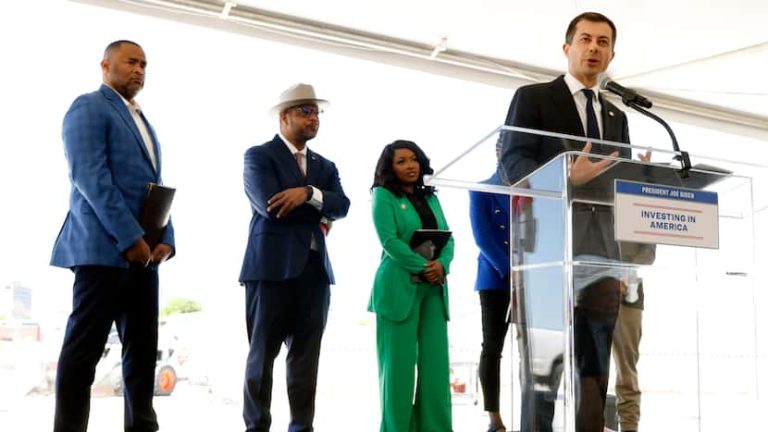A four-story Dallas-area park project aimed at reconnecting neighborhoods divided by highways and increasing green space would get a boost from the Bipartisan Infrastructure and Inflation Reduction Act.
U.S. Transportation Secretary Pete Buttigieg, Mayor Eric Johnson and other elected officials gathered at the proposed site of Southern Gateway Park on Thursday to celebrate an $80 million federal grant announced last month. Part of that funding, $25 million, will be used to complete the second phase of the park from Lancaster Street to Marsalis Street on Interstate 35E near the Dallas Zoo. The funding also includes $20 million for three pedestrian caps on Interstate 30 near the Dallas Farmers Market, reconnecting the Cedars neighborhood to downtown. It also includes $20 million to expand the existing pedestrian deck park at Klyde Warren Park, 1.7 miles to the west, and $15 million for an inverted pedestrian deck on Interstate 5 in McKinney.
“Dallas is a city with thriving modern skyscrapers and bustling urban centers alongside incredibly historic neighborhoods like those found around here, as well as tranquil green spaces like we’re creating here,” Johnson said Thursday. “This grant will help fund projects that will bridge the gap that has long divided our community and ensure all Dallas residents have access to the natural beauty of our parks and the economic opportunities our city has to offer.”
Buttigieg acknowledged that while the 20th century highway system provided essential infrastructure, it also had a huge impact on existing neighborhoods south of Dallas, such as Oak Cliff.
“These neighborhoods were disproportionately home to low-income families and people of color,” Buttigieg said. “It’s no coincidence that the communities that bore the brunt of the disruption were the same communities that didn’t have the political power or resources at the time to block, reshape or change these projects. And although these projects were made a long time ago, those decisions affect people today.”
Buttigieg said Dallas was selected for the competitive grants in part because the projects chosen had “multiple benefits,” including racial equity, increased walkability and green space, and greater economic benefits.
Officials also recognized the role the late Rep. Eddie Bernice Johnson played in promoting infrastructure projects in the area.
The investment is part of more than $3 billion allocated to similar programs across the country, putting D-FW in the top 10% of grants awarded nationwide. But as the region and others like it plan to grow substantially, Buttigieg said more federal funding will be needed to keep up.
“The reality is, even with this historic amount of money that we’ve gotten so far, it’s not going to cover everything that’s needed,” Buttigieg said. “We need to build on this and go even further.”
The funding represents just over 33 percent of the estimated cost of more than $236 million across the four projects, although some projects have already received additional funding from other sources.

